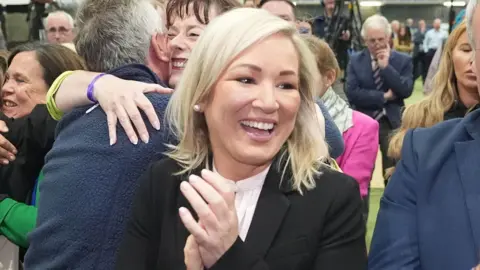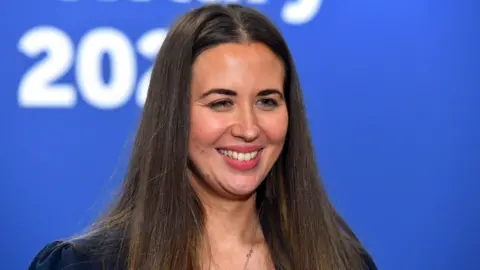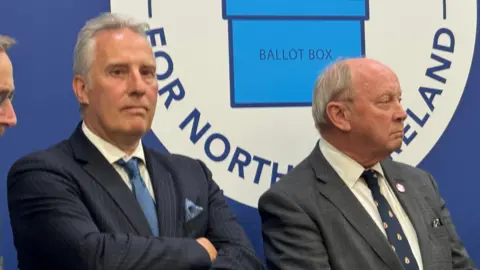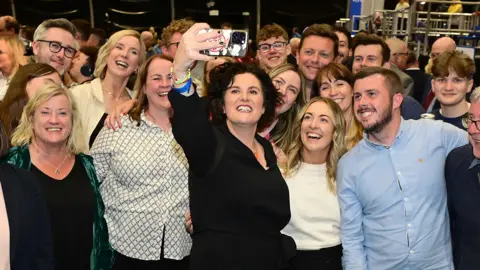By Davy Wilson, BBC News NI

 PA
PA
Sinn Féin has become Northern Ireland’s largest Westminster party for the first time after a hugely disappointing night for the Democratic Unionist Party (DUP).
The nationalist party, which does not take its seats in Westminster, has won seven, the same number as in the 2019 election.
It is also Northern Ireland’s biggest party in the devolved Northern Ireland assembly and at council level.
But the DUP has lost at least three seats from its 2019 total of eight, with the most surprising defeat being that of Ian Paisley in North Antrim.
The seat has been in Paisley family for more than 50 years, having previously been held by his father, and former Northern Ireland first minister, Ian Paisley Sr.
Meanwhile, the DUP also lost its Lagan Valley seat, previously held by former leader Sir Jeffrey Donaldson, to Alliance’s Sorcha Eastwood.

 PA Media
PA Media
There is only one of Northern Ireland’s 18 seats still to be declared – East Londonderry, where the DUP’s Gregory Campbell is also in danger.
BBC News NI understands a full recount will take place with only a few hundred votes separating him and Sinn Féin’s Kathleen McGurk.
The Labour Party has won a landslide victory with Keir Starmer set to become the new prime minster.


Who has been elected in Northern Ireland?
The first seismic result of the night came in Lagan Valley, where Sorcha Eastwood became both the first woman and first non-unionist MP.
She defeated the DUP’s Jonathan Buckley, who was contesting the election instead of Sir Jeffrey after he was charged with historical sex offences.
Ms Eastwood said she was delighted, saying the party’s result was a “huge achievement”.
“I am a Lagan Valley girl born and bred,” she added.
Mr Buckley said “boundary changes” and “divided unionism” lost him the seat.

 PA Media
PA Media
In North Antrim, in a major upset, the DUP’s Ian Paisley lost his North Antrim seat to Traditional Unionist Voice (TUV) leader Jim Allister.
The TUV, which is aligned with Reform UK, had been highly critical of the DUP’s deal to bring the party back into power-sharing government in Northern Ireland.
The DUP also lost in South Antrim to former health minister Robin Swann, meaning the Ulster Unionists will return an MP to the House of Commons for the first time since 2017.
Elsewhere, here’s who have been elected in Northern Ireland:
- Sinn Féin’s Cathal Mallaghan was the first Northern Ireland MP elected, topping the poll in Mid Ulster
- DUP leader Gavin Robinson retained his seat in Belfast East despite the challenge of Alliance leader Naomi Long
- His DUP colleagues Carla Lockhart, Sammy Wilson and Jim Shannon retained their seats in Upper Bann, East Antrim and Strangford respectively
- Sinn Féin’s Órfhlaith Begley retained her seat in West Tyrone as did her party colleagues Chris Hazzard in South Down, John Finucane in Belfast North and Paul Maskey in Belfast West. Dáire Hughes also won for Sinn Féin in Newry And Armagh, replacing Mickey Brady who elected not to run
- Former nursing union boss Pat Cullen held Fermanagh and South Tyrone for Sinn Féin while
- The SDLP’s Claire Hanna also held onto her seat in Belfast South and Mid Down as did party leader Colum Eastwood in Foyle
- Independent unionist Alex Easton wins the North Down seat from Alliance’s deputy leader Stephen Farry
Analysis: Brendan Hughes – BBC News NI political reporter
Ian Paisley losing his seat in North Antrim is the political earthquake that no one saw coming.
For 54 years the seat has been a family dynasty, synonymous with the Paisley name – and the entire DUP.
It was held by the DUP’s founder Rev Ian Paisley since 1970 before his namesake son succeeded him in 2010.
But now it will be TUV leader Jim Allister representing North Antrim in the House of Commons.
His alliance with Reform UK was looking shaky after its leader Nigel Farage personally endorsed Paisley.
But TUV objections to the DUP’s deal to restore Stormont seem to have cut through, enabling Allister to overturn a DUP majority in the party’s heartland.
For Allister, dismissed by the DUP as a “dead-end unionist”, this will be the sweetest of victories.

 Pacemaker
Pacemaker
When will the remaining Northern Ireland results come in?
The first declarations arrived at about 03:40 BST despite expectations the first results would come at 02:00
It was believed most of Northern Ireland’s 18 MPs would be known by about 05:30 but that was subject to any possible recounts.
In total, 136 candidates stood in Northern Ireland in the first general election since 2019.
It operates as first past the post, which means voters put an X in the box beside one candidate who they want to be elected to the House of Commons.
The number of registered voters in Northern Ireland was the largest it has ever been for a general election – 1,363,961.
How can I follow the results?
You can keep up to the date with the very latest across Northern Ireland via live coverage on the BBC News NI website.
The UK-wide results programme hosted by Laura Kuenssberg and Clive Myrie is on BBC Two and the BBC News Channel.
An extended edition of Good Morning Ulster began at 06:00 and is also being streamed on the BBC News NI Website, where live coverage continues throughout Friday with analysis of and reaction to the full picture of results across Northern Ireland and the rest of the UK.










